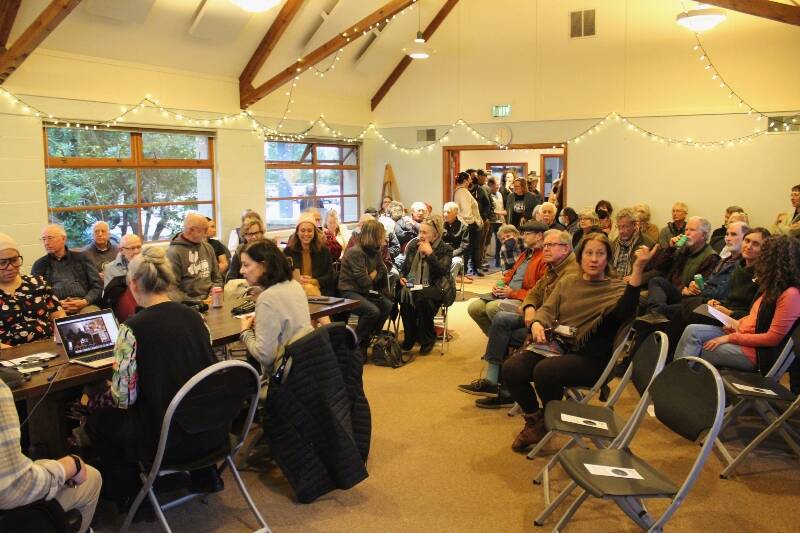Islanders showed up at last Thursday’s Vashon-Maury Island Community Council meeting to hear a detailed update from Esther Lucero (Diné), the president and CEO of Seattle Indian Health Board, on the Health Board’s plans to open a residential treatment center for recovery from addiction.
Approximately 80 islanders attended the meeting in person at Vashon Land Trust — a standing-room-only audience — with another 80 attending online.
Lucero’s talk spanned a broad range of topics, including the news that the facility will be named Thunderbird Treatment Center — the same name as the Health Board’s former treatment facility that operated for 33 years in Seattle’s Rainier Beach neighborhood, before closing in 2019. The naming came after a long period of consultation and polling with former residents and tribal partners.
Showing plans and drawings for the new facility for the first time in a public setting, Lucero said that the previous evening, she and other Health Board leaders first had privately shared the plans with neighbors of the 92-bed facility.
Drawings showed an expansive covered entryway to the facility, leading to a two-story lobby that evoked comfort and welcome.
“As Native people, welcoming people in a good way — with love, letting them know that they are home —is really important,” Lucero said, referring to the lobby. “… We want the best of the best. We want people to walk in and feel like they’ve entered into the finest spa they’ve ever approached — because that’s what our people deserve.”
Other drawings and designs showed spaces for ceremony and reflection, a sweat lodge, a covered play area for children, and more.
The facility will have three separate closed wings for three different populations served — pregnant and parenting people, who may bring up to two young children to the facility with them, a general population, and a 16-bed section for those paying with private insurance.
The 16-bed wing will serve those who seek more discretion and privacy in their treatment. These relatives (as the Health Board refers to all its patients) could include current residents of Vashon with access to private insurance, as well as tribal leaders and their family members. Offering a more exclusive experience, this wing will also help the Health Board offset the costs of operating the facility.
The Health Board hopes to provide job opportunities for islanders at the facility, Lucero said.
She acknowledged the importance of lessons she had learned from her discussions with neighbors of the facility and addressed fear expressed by some in the community over safety concerns.
She said that safety for relatives being served at the site was a priority for the Health Board. The presence of children onsite means that the treatment center will have even more stringent requirements in terms of those who are admitted to the program, she said. Thunderbird’s services will not include detox, she added.
She also said that in the 33 years that the Health Board had previously operated its recovery center in Seattle, there had been no instances of neighborhood crime associated with the facility.
Lucero acknowledged that some in the community are still grieving the loss of Vashon Community Care, the long-term care facility that formerly occupied the property where Thunderbird will now be located.
The Health Board bought Vashon Community Care from its then-owner, Transforming Age, for $11 million, in March of 2023. The property had sat empty since Transforming Age closed the facility in late 2021.
Local groups including Sea Mar Community Health Centers, Vashon Health Care District and Vashon HouseHold viewed the facility in late 2021 but ruled out the property or said they were unable to purchase it at the time.
Note: Expanded coverage of this meeting and the Thunderbird Treatment Center will appear in The Beachcomber in the near future.
Correction: A previous version of this article did not provide a count of those who attended the meeting remotely, via Zoom, and is corrected here. We regret the omission.


